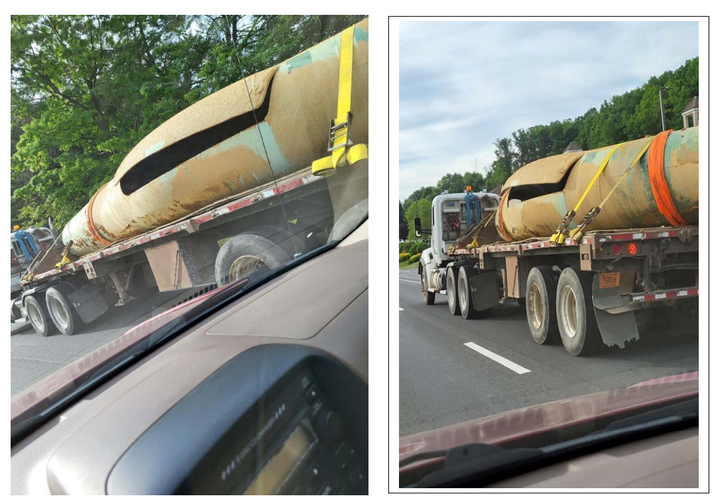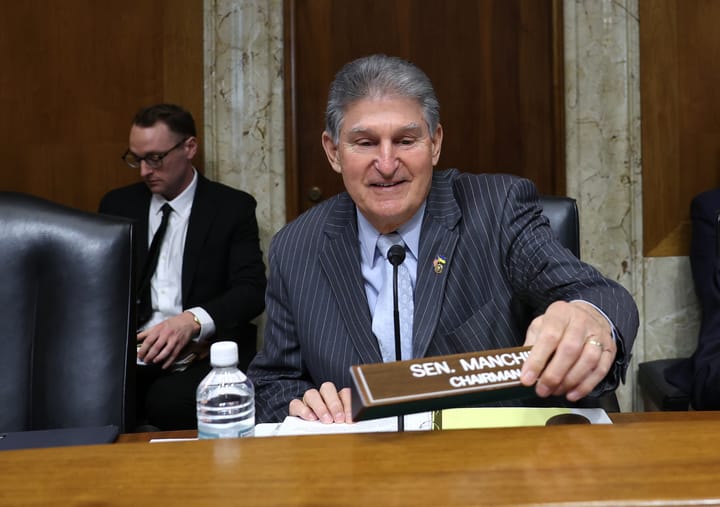The Mountain Valley Pipeline is not yet operating, but it has already sprung a leak. On May 1, the pipeline failed hydrostatic testing when a segment of pipe in Bent Mountain, Virginia burst and began spilling sediment-laden test water into surrounding wetlands. Now, the companies that own the pipeline are engaged in a multifaceted lobbying campaign to convince regulators and lawmakers that the failure was a sign of proper testing, and that the pipeline will be ready to begin transporting natural gas as soon as early June.
Last summer, the U.S. Congress and President Biden signed off on a debt ceiling deal that included a rider expediting approval of the long-stalled Mountain Valley Pipeline (MVP) project by deeming all outstanding permits and verifications approved and by restricting judicial review. The MVP, which will carry natural gas from Pennsylvania more than 300 miles and terminate at a compressor station in Southern Virginia, was initially approved to begin construction by the Trump administration in 2017, but legal challenges over environmental concerns caused the project to sit in limbo.
As a result of the delays, segments of the pipeline sat for years outdoors, some sitting in trenches and some stacked in storage yards along the route. When the fast-track construction of the pipeline was approved in the debt ceiling bill, environmental organizations worried that the project’s materials may have degraded from being exposed to the elements for years.
“A primary area of concern is the integrity of MVP’s pipes and pipe coatings,” a coalition of more than two dozen groups wrote in a letter to federal regulators in a June letter, after the debt ceiling bill was signed into law. “We believe most, if not all, of these pipes were coated between six and seven years ago…yet it appears that pipes that have not been buried have been stored outdoors for years—uncovered and exposed to the elements, including UV rays, rain, snow, wide ranges of temperatures, and wind.” Groups that signed the letter include Appalachian Voices, Sierra Club, and Pipeline Safety Trust.
According to the National Resource Defense Council (NRDC), some segments of pipe for the MVP are stamped as having been coated in 2016, and local residents have not seen any segments that are stamped as having been coated later than 2017. The NRDC cites a National Association of Pipe Coating Applicators assessment that “above ground storage of coated pipe in excess of 6 months without additional Ultraviolet protection is not recommended.”
The MVP is a joint venture between Equitrans Midstream Corporation, NextEra Energy, Consolidated Edison, AltaGas, and RGC Resources. The total cost of the project is estimated to be $7.85 billion, according to Equitrans Midstream.
The Mountain Valley Pipeline’s hydrostatic test failure came just days after its owners had submitted an in-service request with the Federal Energy Regulatory Commission (FERC) to begin operating the pipeline by the end of May. Hydrostatic testing involves running pressurized water through a system to check for leaks and ensure the structural integrity of a pipeline before it goes into service and begins transporting hazardous substances.
The nonprofit Pipeline Safety Trust wrote to FERC on May 10 to urge the agency to evaluate the pipeline’s readiness carefully due to the failed test and other issues.
“A failure during a hydrotest generally indicates that a component of the installed pipe was weak or corrupted in some way,” the group wrote. “While it is positive that the inadequacy was identified before the pipeline is filled with product, it is nevertheless concerning given the explosive risk of such a large diameter, high-pressure gas pipeline. It is too early to tell if this is a sign of a larger problem on the pipeline or an isolated point of weakness.”
Dozens of state and county officials called on FERC to deny the MVP’s in-service request after the test failure. On May 7, eighteen members of the Virginia General Assembly wrote FERC acting Secretary Debbie-Anne Reese asking her to deny the request following what they said was “an alarming pipe failure.”
“As the drinking water, farms and livelihoods of many along the route have already been negatively impacted, adherence to the consent agreement is imperative to minimize further harm,” the lawmakers wrote.
An October 2023 consent agreement between Equitrans and the U.S. Pipeline and Hazardous Materials Safety Administration established an accelerated schedule for safety inspections and evaluations to verify the integrity of the pipeline, and said that audits of the MVP’s coatings would be conducted by a third-party firm. The agreement was entered into by the parties to settle issues raised by the agency in August 2023 after it found conditions along the MVP’s path that the agency said “pose a pipeline integrity risk to public safety, property, or the environment.”
The Montgomery County Board of Supervisors wrote to FERC on May 13 to say they believed that approving the in-service request would be premature.
In response to the concern, Todd Normane, senior vice president for Equitrans Midstream, filed a letter with FERC to dispel what he called “misinformation.”
“In an attempt to derail and continue to delay completion of the project, those opposed to the MVP have been focused on spreading misinformation and unfounded speculation,” Normane wrote.


